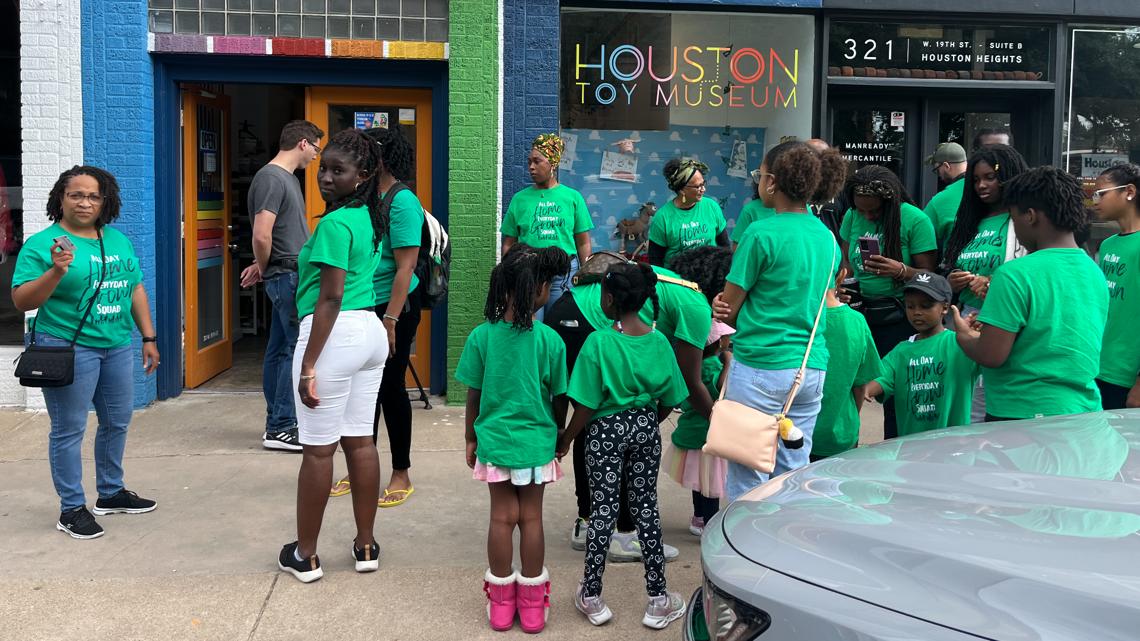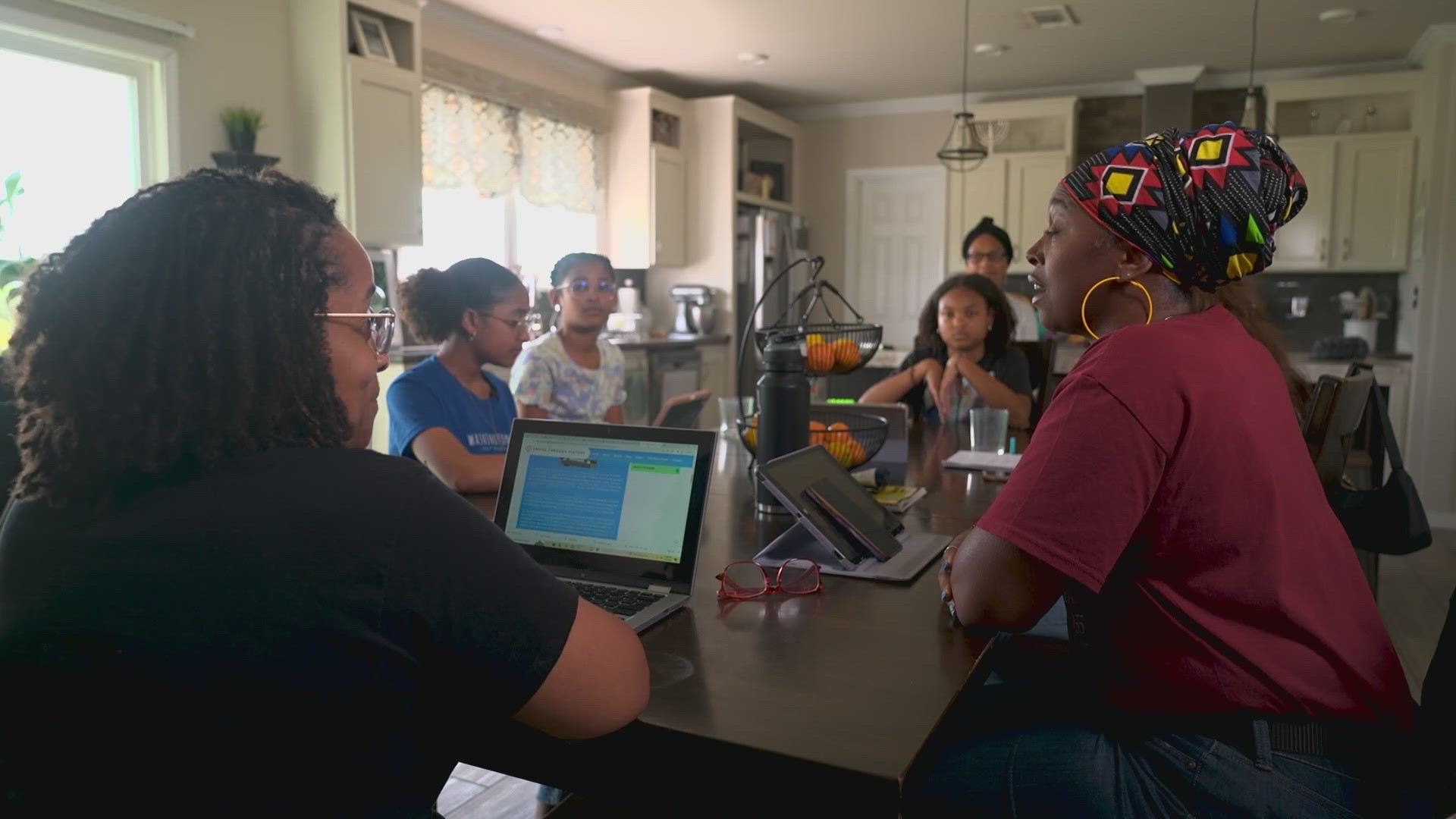CYPRESS, Texas — In a home outside Houston, Tralandra Stewart and Amani Al Talib take turns lobbing questions at the six students sitting across the table from them.
They expect to hear at least one of students -- if not more -- come back with the correct answer. And if they can’t, the women only have themselves to blame.
Stewart and Al Talib took control of their children’s education six years ago. And now, they confidently say, they’re all better off for it.
"There was a need for my children and the families around me to have a safe place for our African American children to go and feel comfortable and safe," Stewart says. "So we created it."
Stewart has three children -- Amiariyah in the 12th grade, Nataniyah in the 10th grade and Kaiyah in the 8th grade. Al Talib adds three of her own in 11th-grader Aliyyah, 9th-grader Karima and 7th-grader Ayan.
They, along with another mom, pulled their kids from public schools outside Houston, and started teaching them together.
Recent events have only reinforced their resolve in that decision.
Says Stewart: "To drop them off at school and wonder if I’m going to be able to pick them up... alive..."
Stewart’s voice trails off. The message of Uvalde and other recent school shootings is evident in her tone, if unsaid.
Al Talib says she and fellow homeschoolers been only emboldened by school boards’ recent push to take certain books off the library shelves: "If someone is telling us, 'No, you can't,' [then] it kind of piqued our interest.”


It's now to the point where their group often compiles reading lists straight from the districts' themselves.
"Like, we make it our mission to read banned books," Al Talib says.
Stewart claims there’s been a concerted effort to, in her words, shave off the rough edges and give public school students a sanitized curriculum.
"Teachers’ hands are being tied," Stewart says. "Laws are being made, and things are being fought in the political realm, to keep history -- our history -- out completely. That’s erasing who we are. And my children deserve better than that."
It wasn’t long before Stewart and Al Talib found like-minded families to join their cause.
Home Grown Homeschoolers started out meeting as a larger group on Mondays, renting a room in a local rec center. Parents would take turns running classes, based on their own expertise.
"We have a father who teaches the kids boxing," Stewart says. "We have someone who teaches them Spanish, someone who cooks with them."
On Wednesdays, they started taking weekly field trips to places like the Houston Toy Museum. Soon, they were organizing teen outings on the weekends, and eventually leveraged the comradery to offer a Moms Night Out and Dads Night Out once a month.


"We say ‘homeschoolers’ but we’re not home very often!" Stewart says, laughing.
At one point, their organization grew to include up to 50 families, with more than 100 kids.
Admits Stewart: "That was…a lot!"
But it mirrored a growing trend. Homeschooling used to be largely dominated by white families, or based on religious education. But Census Bureau shows data shows that African Americans account for the biggest surge in the past few years.
"When we first started, parents had to pay for everything we did," Al Talib says. "If we went on a field trip, we all had to come out of pocket."
But as their group added more activities, some members struggled to afford it -- especially the single moms with several children.
"So we wanted to find a way to be able to pay those expenses, so it’s not a barrier," Stewart says.
Formally adding an "inc." to their organization's operations opened a new world, turning Home Grown Homeschoolers into a registered non-profit.


"Now we have people who just go out and look for grants and donations," Stewart says. "We have people who set up field trips. Everything we do now is solely through donations and sponsors."
The additional scrutiny also forced Stewart and the other founders to create a more streamlined process for accepting new families.
"You go to our website, you apply," Stewart says. "We have an interviewing process, and background checks."
Today, it’s easy for African American families to find a foothold in the homeschooling world, be it through Facebook groups like Black Homeschoolers DFW or African American Homeschool Moms. There’s also a grassroots group in Louisiana called National Black Home Educators that's dedicated to helping other families find the resources they need, no matter where they are in the U.S.
Stewart says the model of Home Grown Homeschoolers could be applied to any group that feels their educational needs aren’t being met.
"A gay couple," she says. "Or it can be an Asian family."


Al Talib looks back on all the mistakes Home Grown Homeschoolers made early on, simply because they didn’t know any better, and suggests they could help others chart a smoother path.
Stewart, circling back to the beginning of this journey when she was a secretary in the public school system, urges other families to realize that the barrier of entry to homeschooling isn't as high as they might think.
"Don’t be afraid," she says. "Find out what type of learner your child is, and what works best for them. Create the space if it’s not there for you. Because if you build it, people will come."

